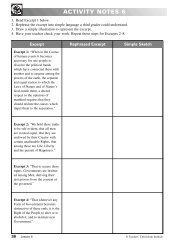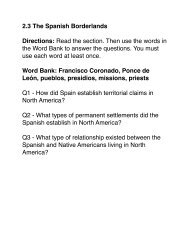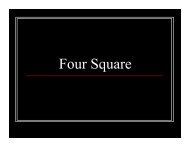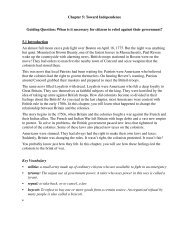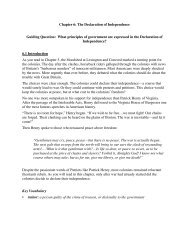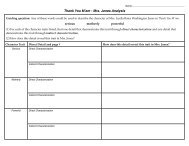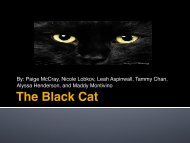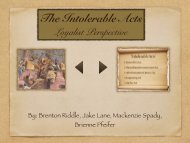History Alive! The United States
History Alive! The United States
History Alive! The United States
You also want an ePaper? Increase the reach of your titles
YUMPU automatically turns print PDFs into web optimized ePapers that Google loves.
guarding the Boston Customs House. “Come on you Rascals, you bloody-backs,” they shouted. “Fire if you<br />
dare.” Some Patriot leaders tried to persuade the crowd to go home. So did Captain Thomas Preston, the<br />
commander of the soldiers. But their pleas had no effect.<br />
As the mob pressed forward, someone knocked a soldier to the ground. <strong>The</strong> troops panicked and opened fire.<br />
Two bullets struck Crispus Attucks, a large black man at the front of the crowd. He was the first to die, but not<br />
the last. <strong>The</strong> enraged crowd went home only after receiving a promise that the troops would be tried for<br />
murder.<br />
Massacre or Self-Defense? Sam Adams saw this event as a perfect opportunity to whip up anti-British feeling.<br />
He called the riot a “horrid massacre” and had Paul Revere, a local silversmith, engrave a picture of it. Revere’s<br />
engraving shows soldiers firing at peaceful, unarmed citizens.<br />
Prints of Revere’s engraving were distributed throughout the colonies. Patriots saw the Boston Massacre as<br />
proof that the British should pull out all of their troops from the colonies. Loyalists saw the tragedy as proof<br />
that troops were needed more than ever, if only to control Patriot hotheads.<br />
One hero came out of this sad event. He was a Boston lawyer named John Adams. Like his cousin Sam, John<br />
Adams was a Patriot. But he also believed that every person had the right to a fair trial, even the hated redcoats<br />
(British soldiers). Adams agreed to defend the soldiers, even though he knew that his action would cost him<br />
friends and clients.<br />
At the murder trial, Adams argued that the troops had acted in self-defense. <strong>The</strong> jury found six of the soldiers<br />
not guilty. Two of them were found guilty only of manslaughter, or causing death without meaning to.<br />
Throughout his long life, John Adams remained proud of his defense of the British soldiers. He said that<br />
upholding the law in this case was “one of the best pieces of service I ever rendered to my country.”<br />
5.6 <strong>The</strong> Boston Tea Party<br />
Despite the hopes of Patriots like Sam Adams, the Boston Massacre did not spark new protests against British<br />
rule. Instead, the repeal of the Townshend duties led to a period of calm. True, there was still a small duty on<br />
tea. But the tax didn’t seem to bother Loyalists very much. And Patriots could always drink Dutch tea that had<br />
been smuggled into the colonies without paying duties.<br />
Things did not stay peaceful, however. In 1773, a new law called the Tea Act prompted more protests. One of<br />
them was the incident that became known as the Boston Tea Party.<br />
(caption)<br />
Paul Revere’s engraving of five coffins showing the victims of the Boston Massacre appeared on flyers to<br />
remind colonists of British brutality.<br />
Page 71<br />
<strong>The</strong> Tea Act <strong>The</strong> Tea Act was Lord North’s attempt to rescue the British East India Company. This large<br />
trading company controlled all the trade between Britain and Asia. For years it had been a moneymaker for<br />
Britain. But the American boycott of British tea hurt the company badly. By 1773, it was in danger of going<br />
broke unless it could sell off the 17 million pounds of tea that was sitting in its London warehouses.<br />
<strong>The</strong> Tea Act lowered the cost of tea that was sold by the British East Indian Company in the colonies. As a<br />
result, even taxed British tea became cheaper than smuggled Dutch tea. <strong>The</strong> Tea Act also gave the British East<br />
India Company a monopoly, or complete control, over tea sales in the colonies. From now on, the only<br />
merchants who could sell the bargain-priced tea were those chosen by the company.<br />
Lord North may have thought he could trick Americans into buying taxed tea by making it so cheap, but<br />
colonists weren’t fooled. <strong>The</strong>y saw the Tea Act as still another attempt to tax them without their consent.<br />
In addition, many merchants were alarmed by the East India Company’s monopoly over the tea trade. <strong>The</strong>y<br />
wondered what the British government might try to control next. Would there be a monopoly on cloth? On<br />
sugar? Nervous merchants wondered what would happen to their businesses if other goods were also<br />
restricted. <strong>The</strong> thought of more monopolies made them shudder.



